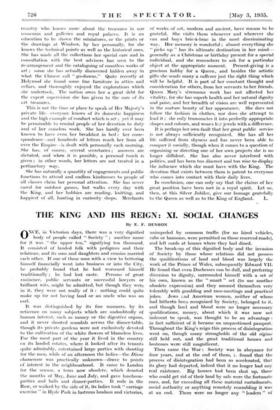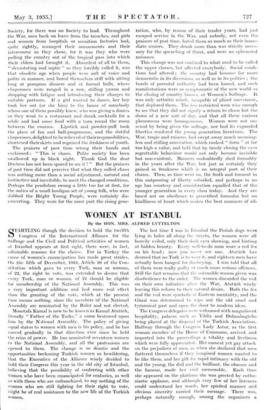THE KING AND HIS REIGN : XI. SOCIAL CHANGES
By E. F. BENSON ONCE, in Victorian days, there was a very dignified body of - people called " Society " ; another name for it was " the upper ten," signifying ten thousand. It consisted of landed folk with pedigrees and their relations, and its sons and daughters and cousins married each other. If one of these sons with a view to bettering himself financially went into business or into the City, he probably found that he had worsened himself traditionally ; he had lost caste. Persons of great eminence, public servants or successful lawyers or brilliant wits, might be admitted, but though they were in it, they were not really of it : nothing could quite make up for not having land or an uncle who was an earl.
It was distinguished by its fine manners, by its reticence on many subjects which are undoubtedly of human interest, such as money or the digestive organs, and it never shouted scandals across the dinner-table, though its private gardens were not exclusively devoted to the cultivation of the white flowers of blameless lives. For the most part of the year it lived in the country on its landed estates, where it looked after its tenants quite admirably, entertained large parties with shooting for the men, while of an afternoon the ladies—the Diane chasseresse was practically unknown—drove to points of interest in the neighbourhood. It came to London for the season, a term now obsolete, which denoted the months of May, June and July, and gave luncheon- parties and balls and dinner-parties. It rode in the Row, or walked by the side of it, its ladies took " carriage exercise " in Hyde Park in lustrous landaus and -victories, unimpeded by common traffic (for no hired vehicles, cabs or hansoms, were permitted on those reserved roads), and left cards at houses where they had dined.
The break-up of this dignified body and the invasion of Society by those whose relations did not possess the qualifications of land and blood was largely the work of the Prince of Wales, subsequently Edward VII. He found that even Duchesses can be dull, and preferring diversion to dignity, surrounded himself with a set of his own, known as the " smart " set (to use another obsolete expression) and they amused themselves very tolerably with gambling and race-meetings and practical jokes. Jews r..nd American women, neither of whom had hitherto been recognized by Society, belonged to it, and though land and blood were no longer necessary qualifications, money, about which it was now not indecent to speak, was thought to be an advantage : in fact sufficient of it became an unquestioned passport. Throughout the King's reign this process of disintegration went on, though many strongholds of the old regime still held out, and the great traditional houses and hostesses were still magnificent.
Then came the War : Society was in abeyance for four years, and at the end of them, i., found that the process of disintegration had been so accelerated, that its glory had departed, indeed that it no longer had any real existence. Big houses had been shut up, those who could get rid of their land by sale were the fortunate ones, and, far exceeding all these material curtailments, social authority or anything remotely resembling it was at an end. There were no longer any " leaders " bf Society, for there was no Society to lead. Throughout the War, men back on leave from the trenches, and girls and women from hospitals or munition factories had, quite rightly, managed their amusements and their intercourse as they chose, for it was they who were pulling the country out of the tragical pass into which their elders had brought it. Absurdest of all to them, " devastating and septic " so they foreiblY called it, was that obsolete age when people were soft of voice and polite in manner, and bored themselves stiff with sitting bing at pompous dinners and at formal balls, where chaperones were ranged in a row, stifling yawns and dropping with fatigue and introducing their charges to suitable partners. If a girl wanted to dance, her boy took her out (or she him) to the house of somebody whom one of them possibly knew, who was giving a dance, or they went to a restaurant and drank cocktails for a while and had some food with a turn round the room between the courses. Lipstick and powder-puff took the place of fan and ball-programme, and the dutiful chaperones, delighted to be relieved of their responsibilities, shortened their skirts and regained the friskiness of youth.
The praisers of past time wrung their hands and exclaimed " This is chaos. Polite society has been swallowed up in black night. Thank God the dear Duchess has not been spared to sec it ! " But the praisers of past time did not perceive that what they called chaos was nothing more than a social adjustment, natural and instinctive and inevitable, to meet the changed conditions. Perhaps the pendulum swung a little too far at. first, for w the antics of a small hooligan set of young folk, who were dubbed the Bright Young People, were certainly dis- concerting. They were for the most part the rising gene- ration, who, by reason of their tender years, had just escaped service in the War, and nobody, not even the praisers of past time, hated them as much as their imme- diate seniors. They drank more than was strictly neces- sary for the quenching of thirst, and were an ephemeral nuisance.
This change was not confined to what used to be called the upper classes, but affected everybody. Social condi- tions had altered ; the country had become far more democratic in its diversions, as well as in its politics ; the bonds of parental authority had been loosed, and such manifestations were as symptomatic of the new world as the closing of country houses, or Women's Suffrage. It was only arthritic minds, incapable of pliant movement, that deplored them. The less restricted were wise enough to see that they did not signify a return to chaos but the dawn of a new sort of day, and that all these various phenomena were homogeneous. Women were not un- sexed by being given the suffrage, nor had its expanded liberties rendered the young generation licentious. The War, tragic and ruinous, had swept away much meaning- less and stifling convention, which ranked " form " at far too high a value, and held that by firmly closing the eyes regrettable behaviour would not only become invisible but non-existent. Manners undoubtedly shed formality in the years after the War, but just as certainly they gained in frankness which is an integral part of their charm. Then, as time went on, the froth and ferment in this outpouring of liberty subsided, and perhaps in no age has courtesy and consideration equalled that of the younger generation in every class today. And they are based not on obedience to prescribed formulas but on kindliness of heart which makes the best manners of all.















































 Previous page
Previous page